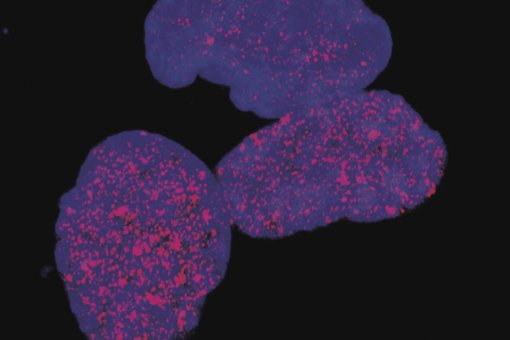Images
Participants


Contact

- The malfunction of cellular condensates is relevant in the development of congenital malformations, common diseases, and cancer.
- The discovery, led by the Max Planck Institute for Molecular Genomics and the Charité – Universitätsmedizin Berlin and involving the collaboration of IRB Barcelona researchers, has been published in the journal Nature.
Many proteins localise to distinct protein-rich droplets in cells, also known as “cellular condensates”. Such proteins contain sequence features that function as address labels, telling the protein which condensate to move into. When the labels get disarranged, the proteins may end up in the wrong condensate. According to an international team of researchers working in clinical medicine and basic biology, such protein mislocalisation could be the cause of many unresolved diseases.
Researchers led by the Max Planck Institute for Molecular Genetics (MPIMG) and the Institute of Medical and Human Genetics at Charité – Universitätsmedizin Berlin, with the collaboration of the University Hospital Schleswig-Holstein (UKSH), IRB Barcelona, and other contributors from around the world, have identified the underlying cause of a rare severe disease called BPTAS (brachyphalangy-polydactyly-tibial aplasia/hypoplasia syndrome). In this case, the disorder is brought about by a genetic change that causes an essential protein to migrate to the nucleolus, which is a large proteinaceous droplet in the cell nucleus.
“We discovered a new mechanism that could be at play in a wide range of diseases, including hereditary diseases and cancer,” says Dr. Denes Hnisz, Research Group Leader at the MPIMG. “In fact, we have discovered over 600 similar mutations, 101 of which are known to be associated with different disorders.”
“The finding led by Dr. Hnisz and colleagues, which Dr. Carla Garcia-Cabau and myself had the pleasure to contribute to, opens the door to new diagnoses that could lead to the elucidation of numerous other diseases, as well as potential future therapies,” explains Dr. Xavier Salvatella, ICREA researcher and head of the Molecular Biophysics Laboratory at IRB Barcelona.
It is currently difficult to determine the number of diseases that share this underlying mechanism, but it is known to be involved in cancer. “The chances of developing targeted therapies for this mechanism are much better,” adds Dr. Hnisz.
“This work represents an example of how understanding how intrinsically disordered proteins perform their functions allows understanding the consequences of mutations and, thus, the mechanisms of the associated disease,” says Dr. Salvatella, who contributed to characterising the consequences of the mutation on the structural properties of the protein studied in this work.
For more information, visit: Max Planck Institute for Molecular Genetics (MPIMG)
Related article:
Aberrant phase separation and nucleolar dysfunction in rare genetic diseases
Mensah MA, Niskanen H, Magalhaes AP, Basu S, Kircher M, Sczakiel HL, Reiter AMV, Elsner J, Meinecke P, Biskup S, Chung BHY, Dombrowsky G, Eckmann-Scholz C, Hitz MP, Hoischen A, Holterhus PM, Hülsemann W, Kahrizi K, Kalscheuer VM, Kan A, Krumbiegel M, Kurth I, Leubner J, Longardt AC, Moritz JD, Najmabadi H, Skipalova K, Blok LS, Tzschach A, Wiedersberg E, Zenker M, Garcia-Cabau C, Buschow R, Salvatella X, Kraushar ML, Mundlos S, Caliebe A, Spielmann M, Horn D, Hnisz D.
Nature (2023) DOI: 10.1038/s41586-022-05682-1
About IRB Barcelona
The Institute for Research in Biomedicine (IRB Barcelona) pursues a society free of disease. To this end, it conducts multidisciplinary research of excellence to cure cancer and other diseases linked to ageing. It establishes technology transfer agreements with the pharmaceutical industry and major hospitals to bring research results closer to society, and organises a range of science outreach activities to engage the public in an open dialogue. IRB Barcelona is an international centre that hosts 400 researchers and more than 30 nationalities. Recognised as a Severo Ochoa Centre of Excellence since 2011, IRB Barcelona is a CERCA centre and member of the Barcelona Institute of Science and Technology (BIST).




